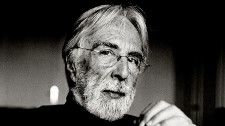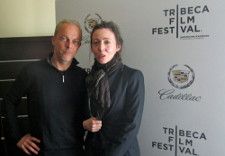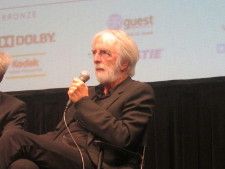
Riding up on the elevator at the Hilton Fashion District Hotel, I overheard a man with a French accent speak about journalists and their tendency to impose opinions and then search for confirmation from a director. Upon reaching the 22nd floor, we both exited and I introduced myself to Yves Montmayeur and thanked him for the warning. After this slightly Hanekian start, we had a conversation about Picasso, Buñuel and David Lynch's nightmares and, of course, cats.
Montmayeur's penetrating documentary about Michael Haneke's career starts with the word "coward" spoken in his 1992 film Benny's Video and features interviews with Emmanuelle Riva, Isabelle Huppert, Juliette Binoche, Jean-Louis Trintignant, Béatrice Dalle, and Josef Bierbichler.
Anne-Katrin Titze: Jean-Louis Trintignant at one point in your film says, "we don't have fun", Haneke has the fun. Did you have fun making this film?
Yves Montmayeur: Yes! As you can see, there is always something happening on the set with Haneke. First of all - and you can see that in my documentary - he is always moving.
AKT: He can't sit still?
YM: Yes, he is so physical on the set. He's not that kind of director who sits in a chair in front of a monitor, directing by giving orders to his assistants. He is someone who's always running around talking with all the technicians there, not only actors. Obviously, if you want to control everything you have to. It was interesting to see a man who is not just a brain, a controlling brain, but physical, too.
AKT: It comes as a bit of a surprise to see him so playful.
YM: You can see that, he really enjoys it.
AKT: You did behind-the-scenes features for him. For most of us the code is unknown. Do you know his code? How did you get all that access? Is it your personality that matches his?

YM: Very difficult to answer this question. Each time you are doing a documentary, it's very chemical. You have a first meeting with someone - something is happening or not. The case of Haneke, I remember the first time I met him, it was at a little film festival in France, in Rennes. I had just missed at that time his movie Benny's Video, which was screening in Cannes. I was very frustrated about that because people told me "you have to see it, it's for you, you love radical movies…" Okay, let's go to Rennes, just after Cannes, and see this movie and I will have an idea. I was amazed by the movie, of course, and fortunately, he was there. Strangely he was there, alone, in the lobby of the film festival. Nobody, after the screening dared to approach him, because everybody was scared of him. There is always the idea that the man doing a harsh strict film must be like the characters. It's always the cliché and of course he was playing with that, too, dressed in black very strict. And at that time, I thought, okay, we need to talk. With him about his cinema. So I dared to approach him and we talked for hours and hours at that festival. We saw each other after that in Paris, we talked and talked. We become friends.
AKT: Is that the reason why you start with a clip from Benny's Video and then jump to Amour before you begin your structure of chronological reverse?
YM: I never thought about this. Exactly, it's personal. I never thought about this but you are absolutely right. It was my first Haneke movie and the scene that impressed me so much.
AKT: Tell me about the scenes you picked for your documentary. You really go for the brutal ones. I was surprised how menacing they are out of context even. I was again terrified with Funny Games, for example. I again closed my eyes with the rooster. You made the decision not to spare us, just as Haneke doesn't spare us?
YM: Exactly. This is my idea when I'm doing a documentary, a film portrait of someone, a cinematic panorama, I try to approach - not in a presumptuous way - the style of a director. In the way of editing and shooting the documentary, I try to be myself a bit Hanekien. Like you say, for example, playing with the deconstructive narrative like he used to practice himself in his movies. It's not a classical narrative, playing with time, that's why I use this non-chronological narrative with brutal shut downs. Sometimes, I guess, it's much more efficient for the audience when you see images. You approach the style of a director much better than with four hours of talking. I think so.
AKT: The greatest trick you have in the film is when he looks into the bathroom mirror on the set of Amour and we believe we are in his home. I could sense how people silently went "wow, he had access to Haneke in his bathroom"!
YM: It worked! You know, it was a joke too, because, as you know, Haneke doesn't like to talk about himself and his intimate life. And once he told me, when I started talking about doing a documentary about him, "don't expect that I give you some information about my background, my childhood. Don't expect that and don't expect to see me in my kitchen cooking." And this way, I use this trick - you are not in your kitchen, you are in your bathroom! It was a trick, as you mentioned.
AKT: Talking of personal matters, is that his cat we see in one scene?
YM: Everybody thought that. It was mine, in my apartment in Paris.
AKT: You have a lovely cat. Cats are the only safe animals in his films. Every other animal he kills off - birds, horses, dogs, poultry. Every pet has to die. Did he ever kill off a cat, though?
YM: No, I don't think so. It could be in his next movie. We have to talk about that. But I remember that my cat at the time loved playing, as they love to do, being in the center of the set. And I remember he said, "Oh what a beautiful cat, I love it." He has a love of animals.
AKT: No auto-interpretation is Haneke's mantra. You were trying.

YM: Yes, of course. It's kind of a game between us. I'm not myself obsessed about getting something from his personal life. He explained to me: If I give you some information about my life, my background, immediately after it will interfere with interpretation of the movie. When I'd tell people I'm making this documentary on Haneke, they expect me to reveal some kind of a trauma. A very classical interpretation of someone who makes harsh movies, so of course he had problems in his childhood. They are talking about the mystery of Haneke. I don't know if there's a mystery. My idea was to keep it in real life.
AKT: You show how he is working.
YM: Yes, that's the more important thing if you want to know a director. If you want to know an artist, you have to know his work. I love for example documentaries like Henri-Georges Clouzot's film on Picasso. It's just Picasso working, looking at Picasso painting on glass, or whatever, you just know a lot of things about him. He is not talking about himself. The gestures help you understand the person. My ideal was really to reveal the man behind his work.
AKT: In the present. Who cares about his childhood?
YM: Exactly. You can't force him to talk, because he won't cooperate. And secondly, as you say, it's not the most important thing. The spectators see someone working, not someone suddenly crying or confessing things.
AKT: it was nice seeing him interact with some of the people, like Sepp Bierbichler, for example.
YM: There's a lot of humor n that scene. Haneke told me once that he was very frustrated because he is injecting a lot of humor in his movies. But nobody cares about that. Nobody mentions that in their critiques. Maybe his sense of humor works better when you are familiar with Austrian literature. Austrian black humor, nihilist humor - you can understand what he is meaning.
AKT: The humor hides in the brutality. "You have to be Buñuel to do dreams," you have Haneke say at one point. Do you agree?
YM: That is at the point when he says "I have no imagination at all. I need real facts for imagining a story." Of course he is a little bit exaggerating, but I know in a way what he is saying. I think it's a challenge for him to do a very strong nightmare. He is doing that in Caché and he is doing it again in Amour. And it works in Amour. It's a challenge for him to do something like Buñuel or David Lynch.
AKT: Is this a direction you see him explore in the future?
YM: It's a question of addressing fears. Nightmares are fears and you need to express them. Expressing fears in nightmares visually is tricky.
Yves Montmayeur, who filmed making-of movies behind the scenes, guides us backward from Michael Haneke's Academy Award winning film Amour to The Seventh Continent, showing him directing, which often consists of Haneke acting out for his performers to copy. Josef Bierbichler, who stars in White Ribbon states that he, Haneke, always gets the menace right the first time.
Yves Montmayeur will present Michael H. Profession: Director at the Tribeca Film Festival on Saturday, April 27, 4pm AMC Loews Village 7-2.





















